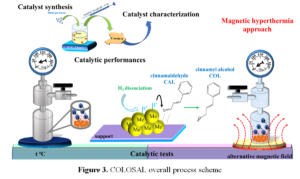Chemoselective catalytic materials with low noble metal loading and magnetic properties – COLOSAL
Project Director: Dr. Mihaela-Mirela TRANDAFIR

Project Leader: Dr. Mihaela-Mirela Trandafir
ResearcherID: AAA-2824-2019
Mentor: Dr. Victor Eugen Kuncser
ResearcherID: C-4299-2011
The COLOSAL project proposes the synthesis of catalytic materials capable to hydrogenate cinnamic aldehyde (CAL) to cinnamic alcohol (COL) or hydrocinnamic aldehyde (HCAL), under environmentally friendly reaction conditions.
The project is carried out over 24 months within INDCFM. During Stage 1 (01.01.2022−31.12.2022) a total of 37 samples were prepared belonging to 2 classes of catalysts having different compositions, such as Me/TiO2/SiO2 or Me/Fe2O3/SiO2 (Me = noble metal ). Of these, 12 samples represented the catalysts of interest.
The catalytic materials were exhaustively characterized using 10 characterization techniques (adsorption-desorption isotherms, XRD, small-angle XRD, transmission electron microscopy - TEM, scanning electron microscopy - SEM, XPS, ATR−FTIR, UV−VIS, TPR −H2 and TPD−H2). Materials containing noble metal NPs were further tested in the hydrogenation reaction of cinnamaldehyde. Substrate conversion was low (max. 18%), although selectivities above 90% in HCAL were obtained.
During Stage 2 (01.01.2023−31.12.2023) it was proposed to change one of the noble metals, with a more reactive noble metal in hydrogenation reactions, so that 8 new catalysts were synthesized which were also characterized by the advanced techniques mentioned above and tested in the selective hydrogenation reaction of CAL. This time a yield of 88% HCAL was obtained, for the total conversion of the substrate.
The activation by magnetic hyperthermia of the catalysts containing Fe2O3 was also achieved, but their thermal response during the radio frequency heating period is low (25 °C compared to the reference temperature), as a result of the weak magnetic character of the oxides components.
The results of the COLOSAL project were awarded as follows:
1) Participation at 3 international conferences – i) EuChems 2022 − Chemistry congress, 28 August – 01 September 2022, Lisbon, Portugal, poster presentation, ii) 8th International Workshop on Materials Physics, 8IWMP, 17-19 May 2023 Măgurele, Romania, poster presentation , iii) 15th European Congress on Catalysis, EuropaCat 2023, 27 August – 01 September 2023, Prague, Czech Republic, oral presentation.
2) The project web page - https://infim.ro/project/colosal_pd-project_77-2019/.
3) Realization of an internship for students from the Faculty of Chemistry on the subject of the PD project.
4) Specialized article - "Selective hydrogenation of cinnamaldehyde on low loading of noble metal based catalysts" - invitation for publication in Catalysis Today (IF=6.5), as a result of participation in the international conference EuropaCat 2023, submission deadline 31.01.2024 (article in the work).
Realization of an internship for students from the Faculty of Chemistry on the subject of the PD project.
PROJECTS/ NATIONAL PROJECTS
Copyright © 2026 National Institute of Materials Physics. All Rights Reserved